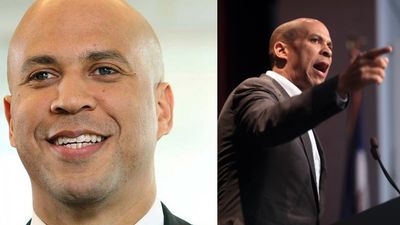In a 1982 congressional hearing, Jack Valenti, head of the Motion Picture Association of America, compared home movies to serial murder: "I say to you that the VCR is to the American film producer and the American public as the Boston strangler is to the woman home alone." Valenti was proved wrong, of course, with some evidence even suggesting that the VCR improved ticket sales. The studios eventually monetized VHS technology and competed with the VCR by maintaining low ticket prices.
Now that Netflix is the new VCR, Slate's Farhad Manjoo makes the case that the film industry actually stands to benefit from the latest technology. Netflix, he argues, is eventually going to kill movie piracy. The film industry, he argued, is adapting to illegal downloading much more quickly than the record industry did. Manjoo, a former illegal downloader himself, wrote, "I'm happy to pay $8 a month for not-terrible [Netflix] selection and amazing convenience. And nowadays, I almost never turn to BitTorrent." In other words, provide people with movies and TV shows at a reasonable price and you'll beat the pirates.
Theaters are a different story. I personally haven't been to a movie theater in months. Granted, that's partially due to laziness and taste, but it's also because the past few years have seen a major increase in at-home entertainment options. And I'm not the only one. In April, movie attendance was down 20 percent from 2010. It was also down in 2010, the second-lowest attended year of the decade. People are seeing fewer films in the theater for a lot of reasons, one of which is ticket prices.
The average movie ticket in America now costs about $8. For a family of four people, who are going to want exorbitantly priced snacks and drinks, a trip to the movies is a $50 experience, and that's assuming they don't live in a big city, where tickets can cost $13 apiece. Some movies are only available in 3-D, which further increases the price. And if you're going to an IMAX theater, be prepared to shell out nearly $20 on a ticket. In one of the worst economies in American history, a lot of people simply can't afford a night at the movies anymore. One survey by the AARP found that 40 percent of seniors don't go to movie theaters because they can't afford them.
If the film studios want to stop shedding filmgoers, they need to find a way to lower ticket prices. Movie theaters keep only a small percentage of ticket sales, which is why they charge so much for concessions. The price-gouging starts with the moviemakers, and unless they come up with a better, cheaper way, Netflix is going to stop them cold—as it stands, the $8 average cost of one movie ticket is exactly how much a person has to spend for an entire month of unlimited Netflix streaming. How do you compete with that? By setting your prices cheap enough to make it worthwhile for people to leave the allure of thousands of movies on Netflix, get in their cars, and drive to the theater. And cheaper tickets start with cheaper movies.
Naturally, the increase in ticket costs has been paralleled by an increase in movie budgets. From 2005 to 2006, when the cost to produce a movie jumped 3 percent, the cost of an average movie ticket jumped 2 percent. From 2006 to 2007, when the cost to produce and market a movie jumped 6 percent, the cost of an average movie ticket jumped a little more than 5 percent. Movie tickets are expensive because movies are expensive, that's not surprising. What is surprising is that there seems to be no attempt to cut down on the spending in order to go easy on film fans' wallets.
The MPAA has stopped releasing data about how much the average film costs to make. We do know that in 2006, the last year for which the MPAA has records, the average movie cost almost $66 million. Tack on marketing costs, and studios spent about $107 million per film that year. That is an outrageous amount of money. And what makes it especially absurd is that it's hardly necessary to spend that much.
On IMDB's crowdsourced list of best movies, the viewers' best-movie picks are rarely the ones that were most expensive to make. The best movie of all time, according to IMDB users, is the critically acclaimed The Shawshank Redemption. In 1994 it cost $25 million to produce, but even in 2010 dollars that's only $36.2 million, almost $30 million less than the average film now. The Godfather, IMDB's second-best movie of all time, cost $31 million in 2010 bucks. Once again, that's much less than the average movie nowadays. In fact, save for Inception and The Dark Knight, numbers nine and 10 on the list, respectively, every single one of IMDB's top 10 movies cost less to produce than the average current film, some by leaps and bounds. Pulp Fiction's budget was $11.6 million when adjusted for inflation, and Schindler's List, a hugely important film, only cost $37 million. What's more, it's not like any of these films were obscure, art house flops—quite the opposite, in fact.
Sure, Inception's production budget was estimated to be somewhere around $160 million, and it's since grossed nearly three-quarters of a billion dollars. But just because expensive movies can be hits doesn't mean all movies have to be expensive. Is there any reason The Hangover II needed to cost more than twice what The Godfather did? In old Hollywood, resources and technology were more limited than they are today, so filmmakers used tight scripts and great actors to make cheap films succeed. Today, people throw $200 million at a revamped Robin Hood, only to watch it sink like a stone. In June, Silence of the Lambs director Jonathan Demme said he doesn't even like to make movies anymore, because "now it costs so much to make them and I am not comfortable spending a lot of money on a movie anymore."
We know for a fact that people can and are making movies for fractions of what Hollywood is spending. Studios don't get to say, "You can't make a movie for less than $70 million," because we all know that not only is that a lie, it's offensive to the people who do make movies for far less than that every day. Patrick James, GOOD's former managing editor, for instance, is currently at work on film called Moving Takahashi. It's a short, but it's a professional project with a lot of talented people working on it. James and his crew have started a Kickstarter to help fund their dream. The cost? $17,500.
On second thought, though, maybe it's best in the long run for everyone to agree to stop going to movies in the theater. Let's all stay home, watch Netflix and Hulu, and thus help whittle away at the film companies' coffers more than people already have. When the studios can no longer pay to make every film a $70 million undertaking, perhaps then they'll get back to doing what real filmmakers have been doing for as long as cinema has existed: Making more with less. When that happens, not only will we be able to afford the ticket, we'll actually want to see the movie.
photo via Flickr user chelseagirl













